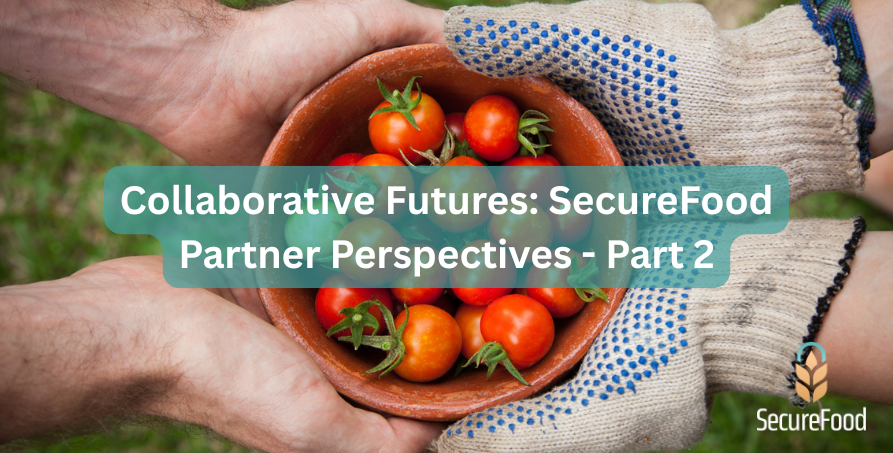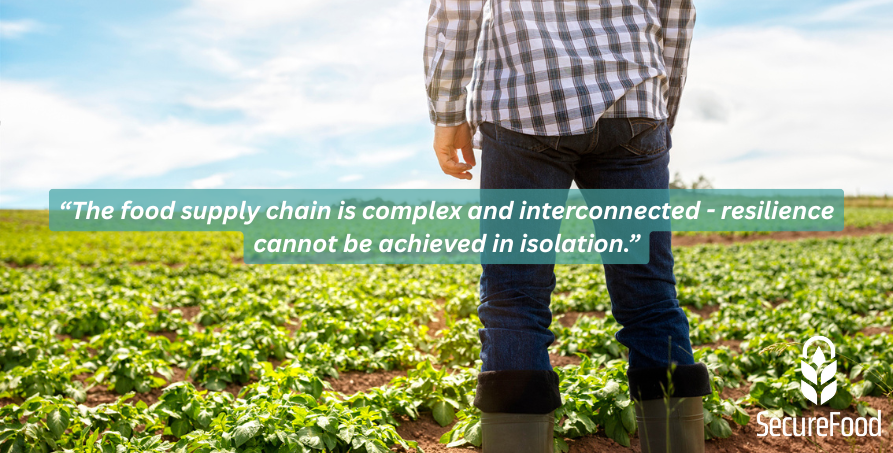
In the second of our three-part blog series on collaboration, SecureFood partners outline their visions for the ambitious project
MC Sonae
Ensuring long-term food security and sustainability requires a resilient and efficient food system. However, significant challenges, such as the impact of climate change on fruits and vegetables production yields and quality, continue to place enormous stress on our food chains. It is therefore crucial to develop strategies that both improve the adaptability of our food systems and ensure the consistent availability of safe and nutritious food. These strategies should address not only short-term risk mitigation but, more importantly, medium to long-term approaches that enable food chain actors to predict and act upon future impact scenarios.
As a leading food retailer in Portugal, we at MC Sonae believe that strategic partnerships, such as those contained within the SecureFood consortium, have a duty to drive meaningful change, to foster innovation to optimise resource use, and to enhance supply stability. By leveraging data-driven insights and novel approaches, we hope that this project will help the sector to better anticipate challenges, improve decision-making, and continue to meet consumer expectations for safety, quality, and affordability.
LUKE
With SecureFood, we hope that the resilience assessment framework will become a valuable tool for understanding and strengthening food system resilience in the face of various challenges, such as climate change, economic instability, and disruptions caused by pandemics or other crises. We envision that the framework should help stakeholders — from farmers to food producers, consumers, and policymakers — identify vulnerabilities, assess potential risks, and implement strategies that build long-term resilience.
We will build on earlier research on resilience, in which we have identified four key elements of a resilient food system:
- 1) the importance of systems thinking through science and communication
- 2) the need for redundancy of activities and networks that distribute risks affecting food system operations
- 3) the need for diversity of production and partners, and
- 4) having buffering strategies, such as national backup systems for emergency supply.
By integrating diverse perspectives and knowledge, we expect Secure to contribute to ensuring that the approach to strengthening food system resilience across Europe is holistic, data-driven, and actionable. By focusing on resilience, we can promote sustainable practices, enhance food security, and ensure that food systems can adapt to future uncertainties.
Ultimately, the project can serve as a vital resource for designing and implementing practices that support resilient food systems worldwide, improving the capacity of communities and industries to better prepare for, respond to, recover from, and thrive, even in the face of regional and global disruptions.

ZLC
Disruptions to food supply chains due to conflicts, trade tensions, natural disasters, and climate change highlight the need for resilient and adaptable food systems. In SecureFood, we at ZLC will leverage our expertise in managing risks and resilience and apply it to the complex systems that are inherent within food value chains.
Additionally, we will be developing advanced supply chain models that will be integral to creating a digital twin of the various food ecosystems under study. This leadership position allows us to enhance the resilience and sustainability of global food systems through our expertise in logistics and supply chain management.
Moreover, we are enthusiastic about integrating the insights and innovations from SecureFood into our own educational programs. By continuously updating our curricula with the latest research findings, we ensure that our students, who are the future leaders in global supply chains, are equipped with cutting-edge knowledge and practical skills. Throughout the project’s duration, every student passing through ZLC will gain a deep understanding of SecureFood’s contributions, preparing them to tackle real-world challenges.
Lastly, we see how SecureFood provides us with a valuable opportunity to expand our network for future collaboration. By working closely with a diverse consortium of partners, we aim to foster long-term relationships that will drive innovation well beyond the project’s duration.
Building resilience through strategic collaboration
The visions shared by SecureFood partners MC Sonae, LUKE, and ZLC reflect the depth and diversity of expertise within the project consortium. From advancing data-driven decision-making in retail, to developing robust frameworks for assessing systemic risks, to designing digital twins that enhance supply chain adaptability — each partner is playing a critical role in shaping a more resilient European food system.
What links these varied efforts is a shared belief in the power of collaboration, foresight, and innovation. By uniting practical industry insights with cutting-edge research and educational outreach, SecureFood is laying the groundwork for solutions that are scalable, sustainable, and responsive to real-world challenges.
As we continue this journey, the collaborative spirit of the consortium will be key to unlocking new opportunities and driving long-term impact — not only for food systems across Europe, but for the global food security landscape as well.
To learn more about SecureFood and to stay updated on our research, work, and progress, visit secure-food.eu or follow us on our social media channels:
LinkedIn: SecureFood
BlueSky: @securefoodeu.bsky.social
X: @SecureFoodEU